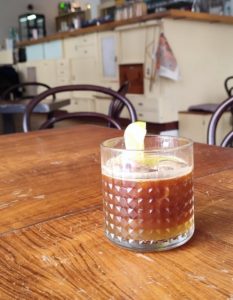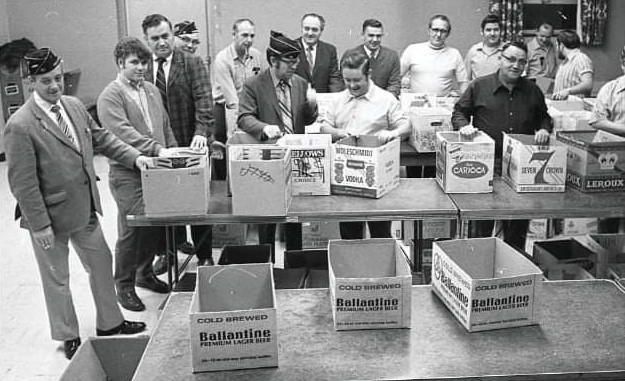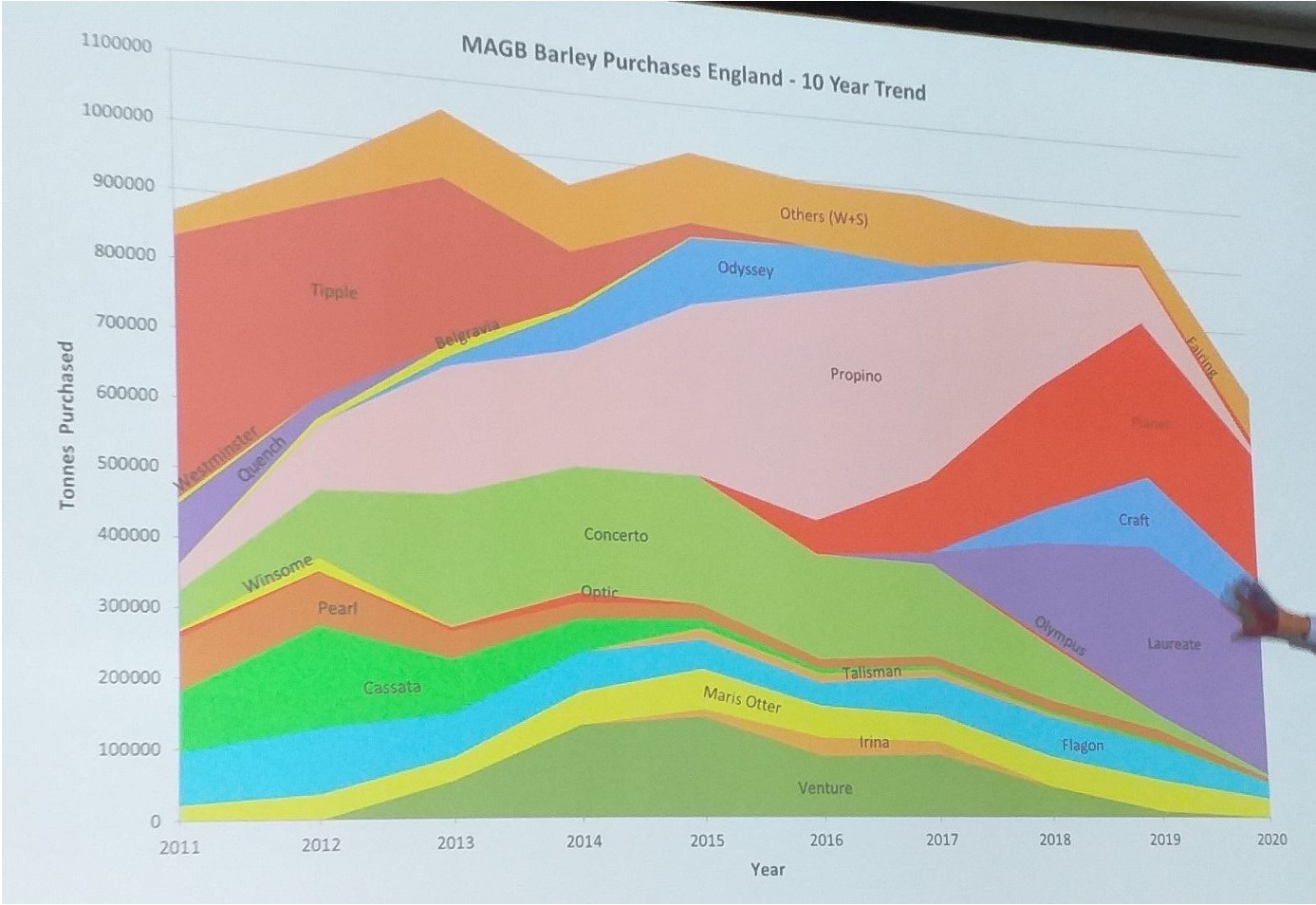I have traditionally hated February. OK, fine – sure – by “traditionally” I don’t mean that we have special hatin’ on February outfits in my culture and we don’t gather outside in large circles holding hands dancing to hatin’ February folksongs and hatey hymns. Maybe they do that in Manitoba – but not here! No, February for me means sofa, blankets and getting weepy when the days are longer but the thermometer is plunging. Out the dining room window we are watching a neighbour’s eaves trough slowly rip away from the house under the weight of the ice. Not much you can do until spring about that one. Why do I tell you this? Because it sucks. And I am not alone in this. But then you read about how a fairly late early modern looking pub facade in Wakefield, England was removed and a Tudor building was found and you think… neato.
 Anyway, what is going on in the world of beer? Beer beer news. Ikea has beer. Who know? Do you have to open the bottle with a little hex wrench?* What else? Feather bowling! I had no idea that such a thing existed but apparently feather bowling is a Belgian pub game… in Detroit:
Anyway, what is going on in the world of beer? Beer beer news. Ikea has beer. Who know? Do you have to open the bottle with a little hex wrench?* What else? Feather bowling! I had no idea that such a thing existed but apparently feather bowling is a Belgian pub game… in Detroit:
The game originally was a Belgian pastime akin to horseshoes and Bocci. These games have many similarities amongst them. Though little is known about the exact origin of the game, it is probable that the resemblance of the balls to wheels of cheese is no mistake. The Cadieux Cafe is proud to be the only home of Feather Bowling in the United States. The game is rarely played in Belgium, and visitors from the old country are often astonished to see the game preserved as it is here.
It looks like bowls on a gutter. Dryland wickedly warped curling. Here’s a video. Speaking of videos, Alistair wrote about watching the Craft Beer Channel on Youtube, something I discovered myself just a few months ago. As usual, drawing from that episode on the micropubs of Thanet** and the lastest from B+B, he took a bit of time to gather his resulting thoughts:
One episode has stuck with me in particular since my little marathon, and that is the one about micropubs in Thanet… I love the concept of the micropub, as it allows easier entry into the world of selling booze as well as allowing the business to be more of an expression of the owner as it is unbound by the conventions of “the pub”. Since watching the video, and reading Boak and Bailey’s fantastic post in BeerAdvocate about their local… Just last week, on our drive to do the weekly shop, Mrs V asked me if I would like to open a micropub, and I had to admit that I had been investigating some of the legalities in Virginia around boozer retailing.
Now, that is the power of amateur video productions available for free on the internets. Gets the brain going. Hey! – is stout really making a comeback? That might be the Protzean point of view:
On Friday it was announced Guinness Stout is the UK’s biggest selling beer, overtaking Carling Lager. UK Stout market now worth £1bn a year. In the small brewing sector, Anspach Hobday Porter is now their biggest seller. Tomorrow Brewdog are launching a Stout “to take on Guinness”
Or… is it all a trap?!? Questions have been posted about the influence leveraged to attain this lofty status. (You know, I once rated higher than Guinness… ah, those were the days…) And ATJ wrote an interesting piece about a grimmer sort of moment in a pub in Aberdeen, Scotland:
Maybe I have that sort of face that attracts certain people, but the slapping man then sat next to me and said something which I could only catch was that his daughter had died. I said I was sorry and then he asked if he could have a drink from my beer. ‘No mate,’ I laughed and he slapped his fist against his hand and I could not understand his words. He was aggressive but for some reason I didn’t feel too threatened, feeling that it was all show.
Am I the only one who thinks the whole “mindful drinking” as a euphemism for low or no alcohol drinks thing is a bit dumb? A bit arrogant even? I mean, when I have a really swell Pouilly-Fuissé I’m being pretty mindful. Paying a lot of attention to what’s in the glass and in my head. NPR covered the story when the superior set met recently:
One of the hottest tickets in Washington, D.C., last weekend was to a festival that was all about drinking and having fun — without being fueled by alcohol. The sold-out Mindful Drinking Fest was emphatically zero proof, but it offered plenty of proof that the movement to drink less alcohol is booming. And with an explosion of new choices, it’s also delicious. From a ginger old fashioned to espresso martinis and spritzes, hop water to pink rosé, the rich complexity of today’s alcohol-free drinks was on full display.
 @JJB aka Stonch’s recent trip to Czechia has been immortalized*** in a series of photos and short vids on Twitter that tell the story of the local scene, certainly in a plain archival sense, better than I’ve ever seen in any travel article or beer book, right down to the 40 watt lightbulb look of some places. That is his picture of an Obora 12 ‘Ježibaba’ at Pult. Not beer pr0n. A picture of a beer. Speaking of the Czech Republic… they now have a pro-NATO cask toting new President.
@JJB aka Stonch’s recent trip to Czechia has been immortalized*** in a series of photos and short vids on Twitter that tell the story of the local scene, certainly in a plain archival sense, better than I’ve ever seen in any travel article or beer book, right down to the 40 watt lightbulb look of some places. That is his picture of an Obora 12 ‘Ježibaba’ at Pult. Not beer pr0n. A picture of a beer. Speaking of the Czech Republic… they now have a pro-NATO cask toting new President.
GBH has taken a break from its unattainable fantasy tourism puffs and published an interesting article on the challenges posed by the revitalization of a favorite brewery of mine, Great Lakes Brewing (of Lake Erie, not the Great Lakes of Lake Ontario):
“10 years ago if you had asked me to tell you what I thought craft beer would be like in 2022, I would have taken a guess,” says Hunger, who’s tasked with figuring out how to brew new products on a large scale after a quarter decade of brewing classic styles. “Now if you asked me to tell you what I think it will be like two years from now, I wouldn’t even attempt that. It’s actually a lot of fun. You get to really flex your skills and use different techniques.”
A bit of legal history I’ve missed due to lazy lawyering. You know what happens – you tend to read the appeals cases like the ruling in R. v. Carling Export Brewing and Malting Company, 1931 CanLII 373 (UK JCPC) or even The King v. Carling Export Brewing & Malting Co. Ltd., 1930 CanLII 46 (SCC) looking for the final result… but never check out the fuller statement of facts like in this case about the taxation of beer brewed in Canada but smuggled into the USA during that nation’s Prohibition era. So I never noticed what was described in The King v. Carling Export Brewing and Malting Co., Ltd., 1928 CanLII 758 (CA EXC) at
…the evidence clearly discloses that these goods were actually placed on board vessels for foreign destination, after due clearance from the Customs. The boats came in, reported inward to the Canadian Customs, reported outward, and they obtained their clearance after the goods on board had been duly verified by the Customs officer. Corroborating this exportation to the United States we have the evidence establishing that Rice Beer or Lager— which constituted the largest proportion of the exportation —is very little used in Canada and that it is the preferred beverage in the United States. Moreover, also by way of corroboration a large quantity of Carling’s special, bottles and kegs were returned empty to Canada through the Customs, and upon which a duty was duly paid. The identification of the kegs is ascertained by the special bungs marked with specific cut figures for that purpose. One witness stated that after seeing some boats clear from the Canadian shore with the goods, he saw them being unloaded on the American shore. Another witness testified he saw the Carling beer in the road-houses in the American towns.
Look at that: 1920s Canadian Federal Customs officials were checking the boats going out to verify their cargo then checked the cargo of the ships coming back loaded with empties. Why? Credits for the beer not consumed in Canada! No need to impose business inhibiting punitive social engineering excise tax on beer bought by Americans! You know, there’s a Canadian children’s TV drama just waiting to be built on that story arc.
And then we have the obituary for Sir Samuel Whitbread in The Times this week that claimed he was a farmer first more than the corporate executive who oversaw the family move away from the booze making trade… but the details given are a bit at odds with that:
He presided over a radical reshaping, prompted by government decree and changing public tastes, that took Whitbread into the international hotel and restaurant business — Beefeater and TGI Fridays — and out of beer production after 250 years. Sam Whitbread sold the group’s spirits business, including Long John and Laphroaig whisky and the coincidentally named Beefeater gin. Under an ambitious chief executive, Peter Jarvis, they diversified into David Lloyd Leisure, Marriott Hotels, Pizza Hut and Thresher off-licences. They soon had more UK outlets than McDonald’s.
Hardly the cow shit on the rubber boots sorta lad I’d call a farmer. I feel particularly well advised on this sort of point of view as I am working my way through 1969’s Akenfield: Portiait of an English Village by the also very recently departed Ronald Blythe, in many respects a grim portrait of almost modern English rural life from the 1860s to the 1960s. The book includes this recollection at page 59 as part of the statement given by a farmer, John Grout, of brewing his farm’s traditional beer at harvest in around the start of the First World War:
You took five or six pails of water in a copper. Then you took one pail of boiling water and one pail of cold water and added them together in a tub big enough to hold 18 gallons. You added a bushel of malt to the water in the tub. Then you added boiling water from the copper until there was 18 gallons in all in the tub. Cover up and keep warm and leave standing for at least 7 hours, though the longer the better. When it has stood, fill the copper 3 parts full from the tub, boil for an hour and add a half pound of hops. Then empty into a second tub. Repeat with the rest. All the beer should now be in one tub and covered with a sack and allowed to cool. But before this, take a little of the warm beer in a basin, add two ounces of yeast and let it stand for the night. Add this to the main tub in the morning and cask the beer. You can drink it after a week. And it won’t be anything like you can taste in the Crown, either…
Each man at harvest was entitled to 17 pints through each day’s work. Resulting results of the brewing unpacked here. Lovely. When harvest was done, all involved stood out in the fields and shouted, then waited to hear those in the neighbouring villages shouting back in reply.
That’s it. Now gather ’round the kiddies as we are on to the indices of Mastodon, podcasts and newsletters. Note: Newsletters. CBC published an archived news post about how newsletters began as letters that brought you news. So is what you are reading really that? Let’s just have a think, shall we? Hmmm… and what song this week as we do? What would I play if this were a movie and these were the scrolling credits? Could it be this? Yup. That’s it…
Boak & Bailey | The B² experience
Katie Mather | Shiny Biscuit and Corto
David Jesudason | “Desi Pubs” (2023) author
Ron Pattinson | The RonAlongAThon Himself
Al Reece AKA Velky Al | Fuggled
Jennifer Jordan | US hops historian
Alan McLeod | A Good Beer Blog (… me…)
Andreas Krennmair | Vienna beer and lager historian
Beer Ladies Podcast | Lisa Grimm and colleagues
Jay Brooks | Brookston Beer Bulletin
Joe Stange | Belgian beer expert, beer magazine editor
Cider Bar | Barry makes Kertelreiter cider
Laura Hadland | CAMRA historian and beer writer
Brian Alberts | US beer historian
Jon Abernathy | The Beer Site
Maureen Ogle | US Beer Historian
Lars Garshol | Norwegian Beer Historian and Kveik Hunter
James Beeson | Beeson on Beer
Carla Jean | MAINER!!!
Thandi Guilherme | Beer Ladies Podcast Co-host
Lisa Grimm | Beer Ladies Podcast Co-host
Rob Talksbeer | Podcaster and Youtuber
Anthony Gladman | UK Drinks Writer
Jeff Alworth | Manna Of Beervana
Northwest Beer Guide | Fairly self explanatory… but not NW Latvia…
Evan Rail | Prague based GBH editor, freelance writer, NYT etc.
Todd Alström | 50% of the Alströms
Jacob Berg | Beer talking librarian
Go have a look yourself. I am up to 750 followers myself. Time and patience and regular posting attracts the audience as per usual. While you are at it, check for more from Boak and Bailey every Saturday and Stan back at his spot on Mondays.
And now the podcasts and… newsletters… First, check to see if there is the highly recommended Beer Ladies Podcast. We appreciate that the OCBG Podcast is on a very quiet schedule these days – but it’s been there now and again. See also sometimes, on a Friday, posts at The Fizz as well (Ed.: we are told ‘tis gone to 404 bloggy podcast heaven… gone to the 404 bloggy podcast farm to play with other puppies.) And the long standing Beervana podcast but it might be on a month off (Ed.: which I have missed from this list for some unknown reason.) There is the Boys Are From Märzen podcast too and check out the travel vids at Ontario’s own A Quick Beer. There is a monthly sort of round up at The Glass. (Ed.: that seems to be dead now… nope, there was a post on July 25th… in 2022 even.) There is more from DaftAboutCraft‘s podcast, too. And sign up for Katie’s (Ed.: now very much less) irregular newsletter, The Gulp, too. And check out the Atlantic Canada Beer Blog‘s weekly roundup. Still gearing up, the recently revived All About Beer has introduced a podcast, too. (Ed.: still giving it a few more weeks to settle in and not be as agreeable…) Plus follow the venerable Full Pint podcast. And the Craft Beer Channel this week on Youtube. Plus Fermentation Radio with Emma Inch. The AfroBeerChick podcast as well! And also look at Brewsround and Cabin Fever. And Ben has had his own podcast, Beer and Badword (Ed.: …notice of revival of which has been given… still not on the radio dial…) And remember BeerEdge, too, and The Moon Under Water. There was also the Beer O’clock Show but that’s now gone after a ten year run… no, it is back and here is the link! The Fingers Podcast has fully packed it in citing, umm, lack of success… as might have been anticipated, honestly.
*Now that’s what I call funny!
**“Class? Class?!? CLAAAAAAASS!!! Now… do remember why Thanet is important in beer history?”
***Well, as immortalized as a picture on a slowly decaying web app will ever be.














